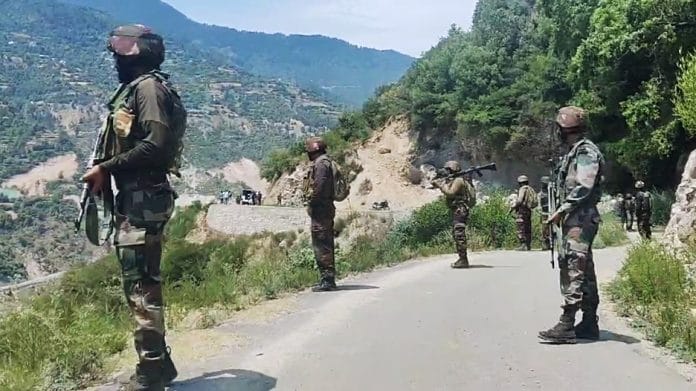The Jain philosophy of anekantavad or the multi-sidedness of truth is powerful advice when thinking about Jammu and Kashmir. Five years ago, Article 370 of the Constitution was abrogated. We’d like to use this important anniversary to make the case that five forces considerably improve the prospects of peace in J&K.
A step back first. A bifocal lens of history — that sees the past as past and present — suggests that five interconnected forces have undermined peace and prosperity in the region.
Pakistan
Kashmir became the vessel for Pakistan’s anger at itself because its founding idea – the two-nation theory – died at birth, with a majority of Muslims staying back in India during Partition. Terrorism wouldn’t exist in J&K without Pakistan’s terror factory’s two-instalment strategy for Kashmir: independence followed by annexation.
Cold war geopolitics
Kashmir became a pawn in the Cold War chessboard after India asked for United Nations intervention on 1 January 1948. Despite thirteen UN resolutions being passed over the following decade in favour of Pakistan, India refused to compromise its sovereignty while Pakistan embraced America. This partnership and military bases gave Pakistan courage, money and air cover.
Radical Islam
The Sufi Islam sect called Ahle-et-Quad to which most Kashmiris belong has nothing in common with the Wahhabis. Kashmiri Islam values ziarats (shrines) while such relics are considered budh parasti (idol worship) by the Wahhabis. Former Kashmir PM Sheikh Abdullah suggested that the Kashmiri Muslims’ religion was a mixture of rishi worship, Buddhism, Shaivism, and Sufism with a veneer of orthodox Islam. I was sad that Kashmiriyat — a term hard to define but captured an authentic mix of culture, religion and tolerance — didn’t prevent the killing of Kashmiri Hindus. However, Kashmiriyat is genuine, and radical Islam’s tools of terror, guns, and religious conservatism are alien.
Fraught federalism
Most other Indian state governments only deal infrequently with Delhi’s pillars of power. But J&K has found that searching for the madhyam marg (middle path) between unitary and federal forces is more challenging. Especially when lasting peace required two decisions that only Delhi could make: abrogating Article 370 and cross-border military strikes.
Separatist politics
Article 370 made soft separatism a profitable local political strategy that reaped a harvest of fear, wealth, and dynastic politics. India has created the world’s largest democracy on the infertile soil of the world’s most hierarchical society because our competitive politics breed ideas, realism, and compromise. But J&K suffered elite capture and became a closed society, economy, and polity.
Hope for Naya Kashmir
The probability of Naya Kashmir has risen for five reasons. First, the abrogation of Article 370 will prevent J&K politicians from practising what Kashmiris call “moolan droth ta patran sag (watering the leaves while cutting the roots)”. Second, cross-border strikes by the Indian military create consequences for Pakistan’s terror factory. Nobel laureate Thomas Schelling’s framing of deterrence as the promise of future pain resonates with me. Third, radical Islam is now accepted as a global problem. In 1995 when I warned visiting Federal Bureau of Investigation (FBI) and American embassy officers that terrorists were turning their attention to the West, they dismissed it as self-interest trying to internationalise an India-Pakistan issue. Fourth, Pakistan’s rising economic and political weaknesses weaken its garrison state. Finally, India’s rising economic and political strength makes peace in Kashmir more likely.
Many analysts dismiss the requests of people in uniform for action against Pakistan as war-mongering or simplistic. But as the subedar major in the 2004 film Lakshya says, “A soldier in uniform understands war is hell more than anybody else.” Security forces in a democracy are tasked with shortening the lives of terrorists, but ending terrorism requires changing the game rather than playing the old one better. Terrorists are similar everywhere – they ignore the laws of war by removing the distinction between combatants and non-combatants, peddle falsehoods about religion, and legitimise mass murder. Those who kidnap, assassinate, bomb, and maim children, women, and men in the name of Islam do not represent Islam. We were, therefore, not surprised when Osama Bin Laden was killed in Pakistan only 54 km from the last J&K Police post in Teethwal. Pakistan’s garrison state’s narrative that there’s a conspiracy by Hanud-Yahud and Nasara (Hindus, Jews and Christians) to destroy the Pakistani quam is nothing but military self-interest.
While lots more work needs to be done, a promising start has been made and we go into elections with signs of Kashmiris seeing Pakistan in their phrase ‘lookan hoondh khoon lookini muth’ (smearing the blood of the people on their own faces). This has happened before; terrorist Maqbool Bhat wrote to his niece after Operation Searchlight in 1971: “Rulers who declare war against their people cannot offer anything to anyone else but injustice”. Maybe because Pakistan’s economy is smaller than Maharashtra. Or maybe we all recognise that nobody other than Pakistan’s military and some selfish J&K politicians have gained from the terror factory that has haunted the region in the last few decades. As historians remind us, in peace, sons bury their fathers. In war, fathers bury their sons. Thankfully, the prospects of peace in J&K are better than they have ever been.
The writers are former Director General of J&K Police and CRPF and an entrepreneur. Their recent book is Kashmir Under 370. Views are personal.
(Edited by Humra Laeeq)






